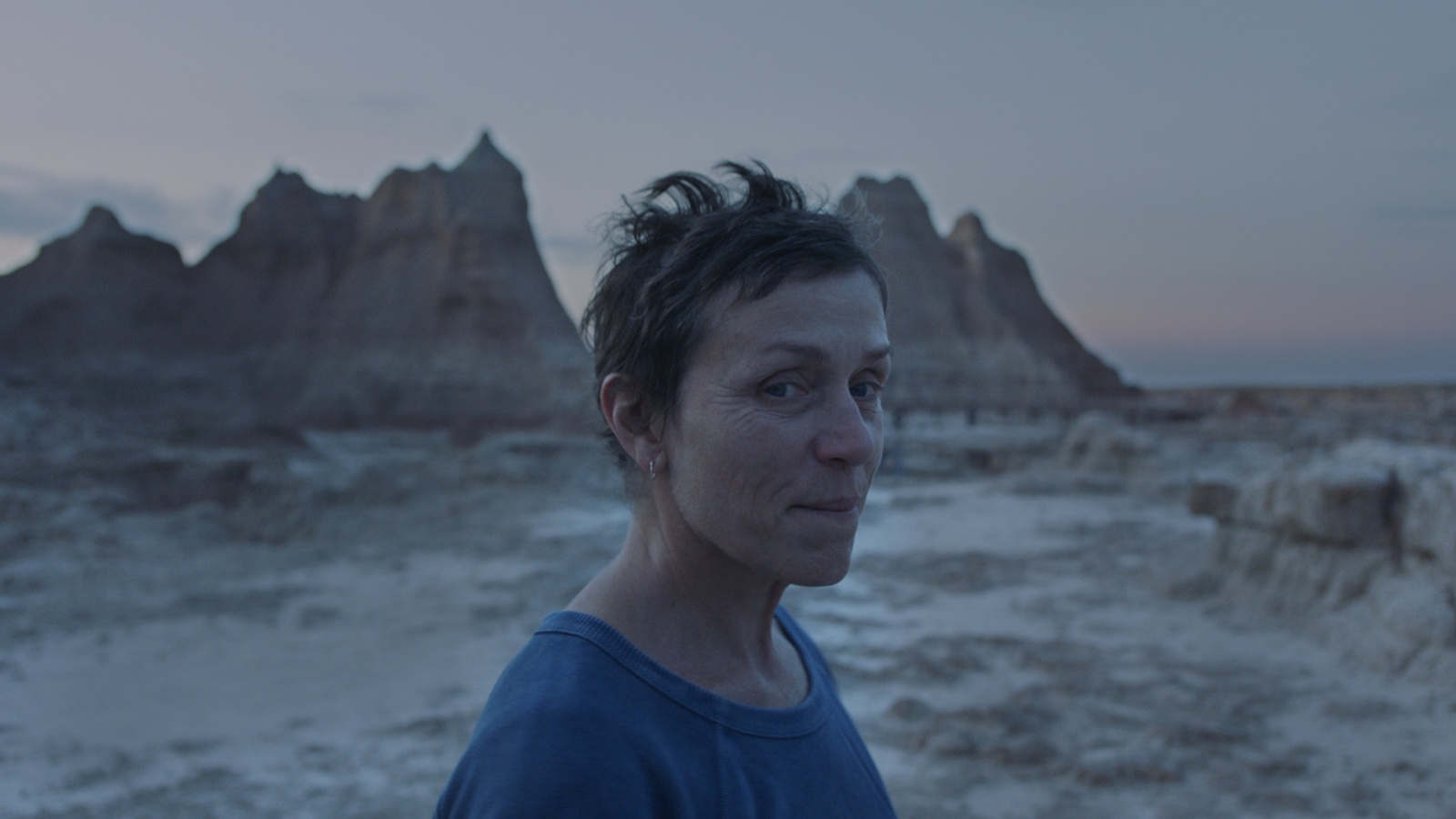For all its contemporary elements, the story of Nomadland is as old as America itself. It’s the same hymn about the myth of the open road, stretching onwards in all its infinite possibilities. Once it was traversed by chuckwagons, and yet now we have a different kind of economic migrant, which this film defines as the modern nomad, heading across vast distances with the same purpose: for the pursuit of happiness, or rather just the next paycheck and meal to keep the wolf from the door.
Chloé Zhao established herself across the past decade with The Rider and Songs My Brothers Taught Me, work that touched on these resonances; it was true American cinema telling grounded, lived-in stories of perseverance and family. For her latest project, Nomadland (and, we imagine, for her forthcoming Marvel film The Eternals), the director is now entering the modern Hollywood fold, and its more prosaic demands on story, pacing, and visual style. Unlike her first two films, this wasn’t a project she originated; Frances McDormand saw The Rider at TIFF and immediately tapped her for an adaptation of Jessica Bruder’s non-fiction book Nomadland: Surviving America in the 21st Century. Zhao transforms it into a fictional story, never leaving the compelling point-of-view of Fern (McDormand, in one of her more restrained performances) as we follow her attempts at this “surviving.”
As opposed to her more original prior work, Nomadland finds Zhao riffing on common themes, maybe even clichés if we’re being uncharitable. What’s very familiar is the “road movie” architecture, seen from The Grapes of Wrath up to American Honey, and its alternately nostalgic and demystifying sense of the American spirit. The novel aspect is the film’s grounding in the upheaval of the 2008 Great Recession, and all the undeserving people whose livelihoods were tarnished. This isn’t the much-recounted tale of the housing bubble, either. The economic crash accelerated social changes that were already underway, with the decimation of smaller and traditional American businesses were a large part of this.
McDormand’s Fern is one such individual forced to transform her life in this hostile environment. Living a fairly idyllic married life in Empire, Nevada with a fulfilling manufacturing job, the dominos then started to fall. She loses her beloved husband, the factory she works at closes, and the tiny, isolated area loses its zip code, making properties untenable. Her solution is to stick up in a well-kitted-out camper van, and bounce from any short-term, well-paying gig she can get, wherever it is located across the western state lines.
The film’s strongest passages come from this picaresque structure, where Fern is traveling from place to place, picking up unusual work and eccentric friends along the way. It’s startling to see a giant corporation like Amazon give permission to use their facilities for filming; perhaps because the critique of their business practices has to be read between the lines by the viewer. Fern works the busy and lucrative Christmas shift there, meeting Linda May, a real-life nomad playing herself in the film. Linda introduces Fern to a community of fellow travelers at a camper park down in Arizona, presided over by Bob Wells (another non-professional actor), “the RV king.” His charismatic addresses to these new nomads sitting in the desert on deck chairs are like a TED talk at a professional summit. All the skills required to be self-sufficient and self-employed are shared, from tips about van maintenance to advice on temporary employment.
In this Arizona community she meets Dave (David Strathairn), another older person pulled towards short-term work and independent living. He’s also the loose thread that, when pulled, leads Nomadland into something more sucrose and conventionally therapeutic. McDormand and Strathairn have lovely chemistry together, reminding us that they’re both favorites of John Sayles, a U.S. indie veteran who is a spiritual forefather to Zhao. But there’s another influential directorial figure who looms large on this film.
These tensions between the demands of realism and pliant sentimentality are also seen in the visual style Zhao employs. The integration of non-fiction works wonderfully, placing McDormand in a bevy of gorgeously-shot natural environments (a rock quarry in a Monument Valley-esque Arizona plain, mountaintops dotted with bubbling springs), where she’s literally the only contrived element present. Otherwise, Zhao is too inspired by the lush natural visuals seen in Malick’s recent work, here with an even-more National Geographic sheen. We also repeat his unusual use of wide-angle lenses, so the leafy or rocky backgrounds loom over McDormand in almost every solitary shot of her.
Nomadland is initially stirring with its imaginative utilization of a Hollywood star as Zhao places McDormand, sometimes jarringly, right in the real world. But it ultimately reverts to homilies, offering a flinty, exciting character a bland third-act volte-face.
Nomadland premiered at Venice Film Festival and opens on December 4

